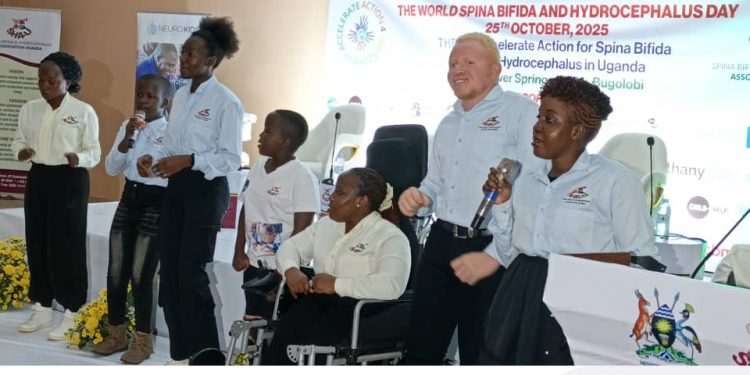Government has been urged to strengthen food fortification with folic acid and include Oxybutynin a vital drug for children living with Spina Bifida and Hydrocephalus on Uganda’s essential medicines list.
The call was made by parents, health experts during the commemoration of World Spina Bifida and Hydrocephalus Day held Thursday at Silver Springs Hotel in Bugolobi under the theme “Accelerating Action for Spina Bifida and Hydrocephalus in Uganda.”
Phoebe Mutonyi, Chairperson of the Spina Bifida and Hydrocephalus Association of Uganda (SHAU), said the government must take stronger steps to ensure food fortification standards are met, as prevention remains the most effective solution.
“Every year, children are born with preventable disabilities because our foods are not fortified enough with folic acid,” Mutonyi noted.
“We are calling on the relevant ministries to ensure fortified foods truly meet required standards.”
Mutonyi also emphasized the urgency of making Oxybutynin, a drug that helps control bladder complications in affected children, readily available in public health facilities.
“Our children’s lives depend on Oxybutynin, yet it is only accessible through donor support. If that support ends, many will suffer,” she warned. “We want it added to the essential medicines list so that no child goes without treatment.”
Representing the Ministry of Health, Dr. George Upenytho, Commissioner for Health Services and Community Health, acknowledged the increasing number of disability-related cases and said the government is working on a long-term plan.
“The Ministry has developed the Rehabilitation and Assistive Technology Strategic Plan (2025–2031) to address prevention, care, and rehabilitation for lifelong conditions like Spina Bifida and Hydrocephalus,” Dr. Upenytho revealed.
He stressed that while medical interventions are crucial, ongoing rehabilitation and assistive support remain indispensable.
At the same event, Nurse Tonny Wambi from CURE Children’s Hospital in Mbale raised concern over the rising number of cases.
“Between January and September alone, we carried out 217 surgeries for Spina Bifida and 1,200 for Hydrocephalus,” she disclosed. “These numbers are worrying — prevention and awareness must become national priorities.”
Wambi also joined the call for government to list Oxybutynin among essential drugs.
“This medicine helps children manage bladder control and prevents kidney damage. Without it, their quality of life drastically declines,” she said.
For Consepta Naluyima, a mother caring for a child with Spina Bifida, the struggle is deeply personal. She shared how her child’s condition was initially mishandled and how she has had to fight daily for her survival.
“Doctors noticed something unusual during pregnancy but didn’t tell me,” Naluyima recalled emotionally. “After birth, my baby was hidden for three days until a visiting doctor identified the condition and referred us to Mbale.”
Her experience underscores the gaps in early detection and care.
“I catheterize my child six times a day. Oxybutynin is only available through donors, yet not all mothers can travel far to get it,” she explained. “Government should make it available here so our children can live with dignity.”
She also appealed to communities to offer compassion rather than stigma.
“Many fathers walk away, but mothers keep fighting. Society should stand with us — these children didn’t choose to be born with disabilities,” she said.
According to the Ministry of Health, Spina Bifida and Hydrocephalus remain major causes of childhood disability in Uganda. Despite improvements in early surgery and diagnosis, experts agree that prevention through folic acid fortification, access to essential drugs, and community support are still lacking.
Mutonyi concluded with a message of hope and urgency.
“Poverty and disability should never define anyone’s worth. If we act decisively now, we can prevent suffering, restore dignity, and give every child a fair chance at life,” she said.














